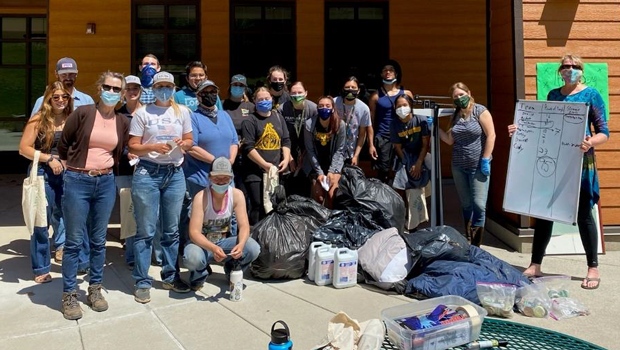
The first major move towards tobacco-free campuses was in 2014 when the UC system banned tobacco use on all its campuses. In 2017 the CSU system followed. Additionally, 66% of community colleges are now tobacco-free.
The project, a division of the California Health Collaborative, is working with Lassen College, Feather River College and the Colleges of the Siskiyous to raise awareness and help students quit using tobacco.
“On Earth Day, August 22nd, Feather River College and Colleges of the Siskiyous hosted trash pickup competitions, sponsored by the Smoke Free High Country Project, and the grand prizes were awarded to the teams that picked up the most tobacco waste,” explains Smoke Free High Country’s project Director, Amanda Berryhill.
“In just one hour, over 150 lbs of trash were collected, including vapes, cigarette butts, and dip cans. These events brought together students, faculty, staff, and Plumas county’s public health Tobacco Use Reduction Program in support of cleaner tobacco-free campuses.”
The colleges took advantage of these events to help educate students, staff, and faculty on the benefits of a tobacco-free campus policy, which would eliminate this toxic litter.
“The project is leading college task forces, hiring a paid college health advocacy coordinator at each campus, and hosting events, like the Earth Day trash pickup competitions, that provide health education and promote cessation services.”
The project will continue to engage students, staff, and faculty at all 3 of these colleges in the far-northern region.
According to Berryhill, tobacco use rates in northern California are nearly double the state average due to the inequities associated with rural life. 99% of adults who smoke start before age 26. Physiological addiction to nicotine makes quitting extremely difficult. An average person takes 10 attempts before successfully quitting, which shows just how essential tobacco-free policies are to remove triggers and help smokers quit.
“While big tobacco has long marketed the idea that tobacco reduces stress, that is a myth. Nicotine addiction both increases stress and reduces the ability of the user to effectively deal with stressful situations. This means that by helping students quit tobacco and creating tobacco-free campus policies to reduce the likelihood of students becoming addicted, colleges will increase the likelihood of students graduating.”
With the invention of e-cigarette technology, nicotine addiction among high school students, which had been on the decline for decades, has shot back up to 38.9%. This is why, according to the SFHC, taking action at college campuses is now more important than ever.
For more information, follow the project on Facebook and Instagram @smokefreehighcountry or get involved by contacting Project Director, Amanda Berryhill at [email protected].
The group is currently recruiting paid part-time college health advocacy coordinators who attend the colleges we are working with.







